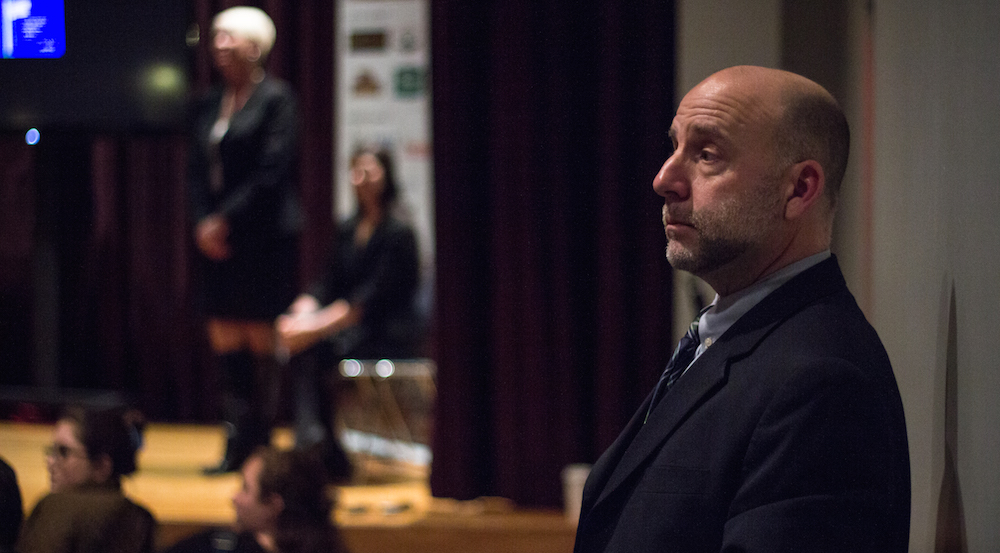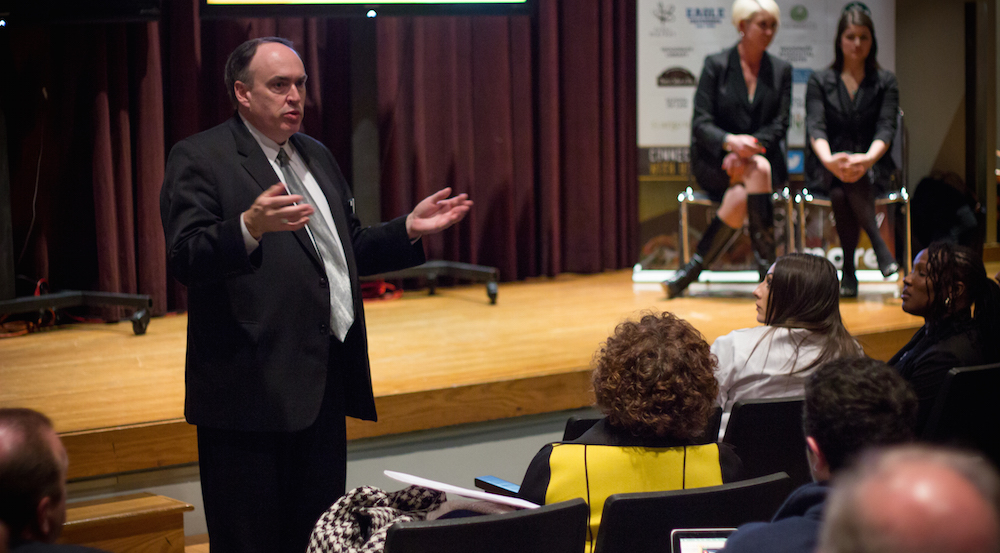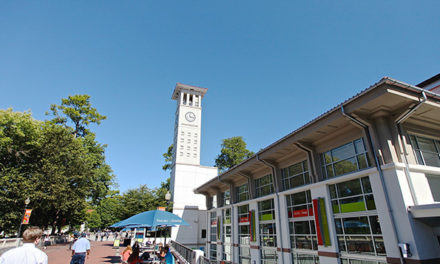
Senior Director of University Food Service Administration Dave Furhman moderated the Bon Appetit and Sodexo dining presentations held on Monday and Tuesday. Photo by Hagar Elsayed/Photo Editor.
Two dining services finalists, Bon Appétit Management and Sodexo, gave presentations to the Emory community earlier this week as the University prepares to potentially renew its dining contract with Sodexo.
Sodexo currently manages Emory’s dining operations, which include the Dobbs Market, Cox Hall and Peet’s Coffee & Tea, among others.
According to Senior Director of the University Food Service Administration Dave Furhman, Emory is in the final year of a 10-year contract with Sodexo that will expire on May 31.
“Like any campus that outsources their dining, there are choices,” Furhman said. “You could just renew a contract, and we decided not to, not because we are not happy with Sodexo, but we felt it was our responsibility to do that.”
According to Furhman, a committee including students, faculty and staff narrowed the field down to two finalists: Sodexo, the incumbent, and Bon Appétit.
“We looked for students that represented different constituents on campus,” Furhman said. “We have a couple students representing the Food Advisory Committee Emory (FACE), a student representing SGA [Student Government Association], a student representing RHA [Residence Hall Association] and a graduate student.”
According to FACE Co-Chair Molly Talman, students who wanted to increase the student voice in Emory Dining started the committee three years ago.
Talman and her co-chair, Bryce Robertson, work with an executive board of about 10 students to establish working relationships and relay communications between the students, Emory Dining and the dining contractor. (Robertson is also a sales associate at the Wheel.)
Bon Appétit gave its presentation on Monday evening and Sodexo gave its presentation on Tuesday.
At the Bon Appétit presentation, Bon Appétit Cofounder and Chief Executive Officer Fedele Bauccio described his dream for the company.
“We want to be the premier on-site restaurant company,” Bauccio said. “The word ‘restaurant’ is important, known for its culinary expertise and a commitment to social and responsible practices.”
He added that his goal was to create a chef-driven restaurant company that had healthy but delicious food.
According to Bauccio, Bon Appétit, which cooks everything from scratch, operates at 500 locations and has approximately 17,000 employees.
Bauccio also estimated that Bon Appétit will reach $1 billion in revenue this year and operates at numerous locations including Massachusetts Institute of Technology, Duke University, Washington University in St. Louis (Wash. U), Google, Amazon and Yahoo.
According to Alyse Festenstein, a Wash. U graduate and Midwest Fellow for Bon Appétit, the company purchases a minimum of 20 percent of its products from small owner-operated farms and ranches within a 150 mile radius.
“Buying local is in our DNA,” Festenstein said.
College sophomore Annie Caplan wrote in a message to the Wheel that she generally enjoyed the presentation.
“Bon Appétit seems committed to great customer service, getting involved at the community level and engaging with students and faculty with regards to eating healthy,” Caplan wrote.
Caplan, a vegan, wrote that she has a hard time finding suitable dining options on campus.
“Although I appreciate the efforts made at the current [Dobbs Market] vegan station, options are often limited,” Caplan wrote. “Bon Appétit realizes this problem and their commitment to satisfy vegans, vegetarians and those with food allergies seems promising.”
Tyler Friedman, a sophomore at Wash U.’s Olin Business School, which is served by Bon Appétit, wrote in a message to the Wheel that he is satisfied with the food but he claims that it gets tiring after a while.
“I really enjoyed the meals and was pleasantly surprised by the quality and taste of meals, as well as the options,” Friedman wrote. “After a couple semesters, I started to get tired of the food, but I still think it’s good in moderation.”
While there has been public concern at Emory for how Sodexo treats its dining employees, “nearly everyone who works for Dining Services at Wash. U is in a good mood and is very friendly,” Friedman wrote.
He added that he had heard of “numerous occasions where an employee has made a student feel better on a down day, whether it is just being friendly or giving them an extra chicken tender.”
At the Sodexo presentation on Tuesday, Sodexo Resident District Manager Todd Schram discussed Emory University’s sustainable food initiative to reach 75 percent local and sustainable purchasing.

Todd Schram, resident district manager for Sodexo, answers questions raised from the Emory community at the Sodexo dining presentation in Harland Cinema on Tuesday.
“This is a big challenge, and we love to be a part of it,” Schram said. “We believe that we have provided a roadmap to get there.”
Schram also discussed Sodexo’s sustainable product changes on campus, including grass-fed beef at the Dobbs Market and chicken from Springer Farms.
All the products offered are compostable and recyclable, he added.
“This is really the just the tip of the iceberg,” Schram said. “There are so many things that we have done and want to continue to do.”
At the presentation, Schram proposed changes to current dining retail space including a makeover of Dooley’s Depot and a second floor of dining space at Cox Hall.
According to Furhman, these are only proposed concepts.
“It’s important to remember we have submitted a proposal — if we are selected as the preferred partner, we’ll have further discussions with Emory to finalize the plans for the venues,” Schram wrote in an email to the Wheel.
The company’s goal is to have one of the best dining operations in the country, according to Schram.
“With the leadership of [Senior Vice President and Dean of Campus Life Ajay] Nair and the Campus Life mission, along with the Dining vision created by Dave Furhman and FACE, we feel we have the foundation in place to make this a reality,” Schram wrote.
According to College sophomore Jake Lerner, the food options Sodexo offers are good, but he’d like to see some changes to the dining options so that students who live on campus don’t get bored of what is being offered.
During their presentation, Sodexo staff members stressed their ability to work with the 27 to 32 students at Emory University who have specialty diets. College sophomore Melissa Engel has a specialty diet with allergies to milk, eggs, peanuts, tree nuts and shellfish. As a result, it is very hard for her to find places that accommodate her needs.
“Sodexo has gone above and beyond what I ever could have imagined,” Engel wrote in an email to the Wheel. “I established relationships with the Sodexo team while I was in high school, and the staff now feel like family to me.”
According to Engel, she receives special ordered products including safe bread, cereal and salad dressing, all of which are prepared separately to ensure there is no contact with other foods.
“I could not ask for more and cannot imagine my life at Emory with a different dining services contractor,” Engel wrote.
She added that she hopes the University “acknowledges Sodexo’s compassionate care, especially in accommodating students with special diets.”
At the end of the presentation, multiple community members raised questions regarding the Sodexo’s treatment of workers and Sodexo’s involvement in private prisons.
In 2011, a public campaign by international labor union Service Employees International Union (SEIU) targeted Sodexo, according to Schram.
“In September 2011, Sodexo and SEIU announced a settlement agreement under which SEIU ended the campaign against Sodexo,” Schram wrote. “The agreement resolved a civil lawsuit filed by Sodexo in March 2011 in response to the campaign.”
According to Schram, 15.2 percent of Sodexo employees at Emory work part-time. At Sodexo’s presentation, a member of the audience asserted that part-time employees do not receive company benefits and are not eligible for medical, dental, vision, disability, life insurance, family care, accidental death and health care benefits.
According to an Emory Dining fact sheet on Sodexo, the company provides all of those benefits, in addition to paid sick leave, paid vacation, educational assistance and domestic partner benefits, to its full-time employees.
The fact sheet did not list such benefits for part-time employees but said those workers “receive company-provided uniforms, including one pair of slip-resistant shoes per year and free meals.”
According to a 2010 report released by Human Rights Watch, a New York based non-governmental organization, Sodexo took actions contrary to its international commitments, specifically the food services operation of Lafayette College in Easton, Pennsylvania by thwarting trade union formation.
Ultimately, Sodexo entered into a settlement agreement with the National Labor Relations Board in 2011.
The Human Rights report also said that in 2011, the 120,000-member University of London Student Union passed a motion to boycott Sodexo in solidarity with “workers around the world who are denied their basic human rights.”
Emory student group Students and Workers in Solidarity (SWS), which formed in 2010, protested on the Quadrangle in April 2011 in response to reports of mistreatment of food service workers at Emory.
Seven students were arrested for trespassing on the Quad at the time. Part of the SWS initiative stems from a 2010 Human Rights Watch report that found Sodexo violated human rights standards in the multiple countries around the world.
According to College freshman Michael Demers, who is involved with SWS, Sodexo’s contract was originally set for termination in 2011, and student members of Emory SWS engaged in dialogue with the administration.
“The University did not fulfill its commitment to create regulatory standards for Sodexo,” Demers said.
He added that “Emory rubberstamped the Sodexo extension,” and consequently, “students took direct action.”
According to Demers, the protest not only criticized the way Emory handled the process regarding forcible contracts, but also critiqued Sodexo.
“The Sodexo presentation on Tuesday was a bunch of rhetoric that sort of touched upon a number of talking points, which are part of a checklist for a liberal university,” Demers said. “They talked in vague terms, and their historical record has only showed a tremendous amount of injustice.”
Ross Gordon (‘12C) said he was involved in the 2011 protests because he was unhappy with Sodexo’s presence on campus as well as Emory’s ability to create meaningful contracts.
According to Gordon, Emory implemented policies to subdue the issues revolving around the protests in 2011, including the formation of the Committee on Class and Labor and Task Force on Dissent, Protest and Community.
In contrast to SWS’s opinions, College sophomore and FACE member Michael Frank said that “anyone can see around campus that the Sodexo employees dance, they are happy around here and they are always very nice to talk to.”
“Whatever happened in the past happened is the past but since I have been at Emory, I haven’t noticed any ill treatment of laborers,” Frank said.
According to Talman, Bon Appétit and Sodexo had great presentations that included ideas to improve the Emory community.
“Both Sodexo and Bon Appétit have demonstrated in their presentations and in practice that their employees are their family,” Talman wrote.
He added that “the Emory community feels the same way; therefore, both finalists chosen met or exceeded Emory’s standards of fair and just treatment of employees.”
According to Furhman, whoever wins the contract will be charged with moving Emory closer to its goal of providing 75 percent local and sustainable food.
Furhman stressed that if there is a change of management, no current hourly staff will lose their jobs.
Overall, Furhman was satisfied with the presentations.
“They both provided a good, solid overview of their proposal while also giving our community a strong sense of their company culture and how it fits with Emory,” Furhman wrote in an email to the Wheel. “I think the Emory community had a terrific opportunity to be involved in the process and ask important questions.”
According to Furhman, the committee will make a recommendation to the University in March.
“We are fortunate to have two extraordinarily strong candidates, each with a long list of terrific qualities and proven capabilities,” Furhman wrote.
— By Brandon Fuhr, Senior Staff Writer
Digital Editor | Brandon Fuhr is a College junior from Briarcliff Manor, New York pursuing a triple major in art history, forensics, and nuclear neuroscience. Jokes. This kid is straight Business School material. When he isn't studying Corporate Finance, you can find him spinning, playing FIFA or at Chic-Fil-a (or all three at once). He is a Digital Editor for the Wheel and works to create digital features and ensures the website is fully functioning. More importantly, he is responsible for ensuring no Wheel editor goes home hungry. Orchestrating meals for a group of 20 college kids is no easy feat, but he strives to never disappoint.





